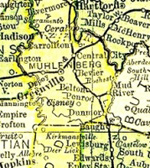Biographies B
Don Carlos Buell
Don Carlos Buell, major general of volunteers, U.S. army, was born in Ohio, 1818; graduated at West Point academy, 1841; was appointed 2d lieutenant in 3d infantry, regular service; promoted 1st lieutenant, June, 1846; brevetted captain for gallantry at the battle of Monterey, Sept. 23, 1845. His regiment subsequently served under Gen. Scott on the southern line of operations in Mexico, where Buell distinguished himself at Churubusco and Contreras, and was brevetted major; in the later battle he was severely wounded. He became assistant adjutant general with the rank of captain, Jan., 1848; relinquished his rank in the line, March, 1851, and was employed in the duties of his office until 1861, when he assisted in organizing the army at Washington. He was appointed brigadier general, and assigned to a division in the army of the Potomac, which soon became noted for its through discipline. In Nov., 1861, he superseded Gen. Sherman, then in command of the army of the Cumberland - which he reörganized as that of the Ohio, with head-quarters at Louisville, Ky.
Gen. Buell assumed the command of this army (if army it could be called) at a critical period in Kentucky. Sherman had notified the government at Washington that 200,000 men were necessary for the campaign in the southwest. His opinion was hooted at; he was considered a mad man, and this was the direct cause of his removal. Subsequent events justified his opinion and confirmed his sagacity. The people of Kentucky were divided, but at that period the sentiment for the South was intense and the preponderance was against the North. The army had to be organized. There were few reliable troops, most of the regiments were new, and many of them incomplete. Above all this, it was the policy of the Federal government, then, to conciliate the people of Kentucky -l not alone to prevent an outbreak, but to win them to the Union cause. This seemed at least to be the object of Mr. Lincoln's administration. Its bad faith became apparent afterwards. Gen. Buell was, therefore, expected to enact the part of the soldier and the statesman. He did both well. His moderate course, his kindness and courtesy towards the non-combatants who were necessarily sufferers by the armed occupation of the state, won the respect of the Southern sympathizers and commanded the admiration of the best friends of the Union cause. During the winter of 1861-2, he organized his troops for the advance movement, which was to drive the Confederates from the state. He submitted his plan for this purpose to Gen. McClellan, then at the head of the army. It secured his approval; and the result was the fall of Forts Henry and Donelson, the retreat of the Confederates from Bowling Green, and their subsequent evacuation of Nashville and ultimate withdrawal south of Tennessee river.
The limits of this sketch will not admit a detailed account of the operations of Gen. Buell's army. But it is a part of the history of the war, that when Grant was utterly beaten at Shiloh by Albert Sidney Johnson, and thousands of his troops cowered under the bank of the Tennessee river, and the capture of the whole army was imminent, Buell saved it - by a rapid march and checking the victorious Confederates with Nelson's division. Directing the operations the following day, he forced the Confederates to retreat. Not even Dessaix's exploit at Marengo - which turned defeat into victory, and made Napoleon the arbiter of Europe - was more brilliant than that of Buell, whose decisive action and soldierly qualities achieved a triumph which but for him had been a terrible disaster. His parallel march with Bragg into Kentucky, the defeat and ignoble flight of that general from the state, are too well remembered by all. But during this entire period of time the political enemies of Buell were at work. He conducted the war for the purpose of restoring the Union. They repudiated that policy, and demanded generals who would be the supple instruments of their will. Their machinations at Washington finally resulted in the displacement of Gen. Buell from the command, which already twice before he had asked to be relieved of. They next instituted a court of inquiry into his military operations; and after six months' trial of a court which was hostile to him, the proceedsing were sent to the president. Over nine years have gone by, and they have never yet been promulgated. The reason is well understood - the findings of the court were complimentary and not prejudicial to Gen. Buell. Before 1866, Gen. Buell resigned his commission in the army; and not long after became a citizen of Kentucky, and engaged extensively in the iron business in Muhlenberg county.
In 1862, when the late Walter G. Overton (who died in Louisville, July 9, 1872) emerged from prison, after months of confinement, he applied to Gen. Buell to revoke the order, issued from Washington city, Sept., 1861, for the suppression of the Louisville Daily Courier (of which Mr. O. had been one of the editors and also interested in the proprietorship). “Sir,” said Gen. Buell “it is not my purpose, nor is it my right, to interfere with the freedom of the press. You can print your paper.” This sentiment was alike honorable to and characteristic of the soldier and the man.
Source: Collins, Lewis, and Richard H. Collins. Collins' Historical Sketches of Kentucky. Vol. 2. Frankfort, KY: Kentucky History Society, 1966. Pages 642-643.
Updated July 6, 2018
